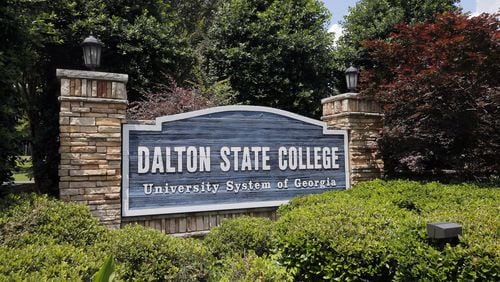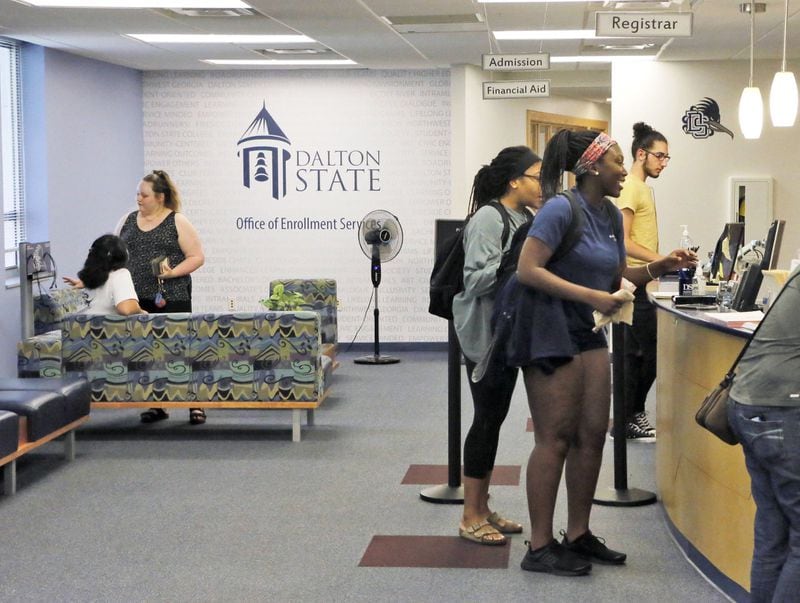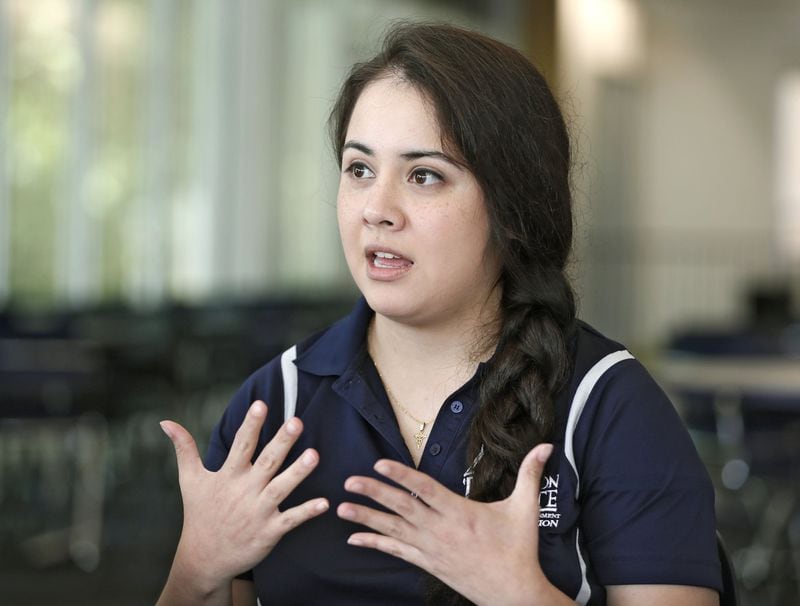Dalton State College student Bryan Lopez is part of a school team that will, as part of its many duties, recruit students across the state line in Tennessee this fall.
Lopez, 22, an aspiring dentist who came with his family from Guatemala when he was 12, will stress to his target audience — Hispanics — that this college is the place for them.
The percentage of Hispanic students is rapidly rising at this northwest Georgia campus. The student body of about 5,100 recently surpassed a milestone: its Hispanic enrollment exceeded 25 percent, which qualified it as the first college in Georgia to become a Hispanic-Serving Institution. That makes it eligible for some extra federal benefits.
The enrollment increase is startling and reflects a cultural shift in the region. Just two decades ago, less than two percent of Dalton State’s students were Hispanic. The growth has pushed the college to offer courses and services that the students need as their families and regional leaders rely on them to help rebuild the base of a once booming economy that has struggled since the Great Recession. Hispanics now make up nearly half of the city of Dalton’s population and more than two-thirds of the students in the city’s public school district.
Most of Lopez’s work with the college involves helping existing students.
“It’s inspiring to me, knowing that I’m able to help,” he said.
Lopez’s family, like those of many Hispanic students, came to Dalton to work in the factories that earned the city its title as “carpet capital of the world.” Student government association president Carolina Gomez’s family came here from New Jersey for the same reasons.
The recession hit Dalton hard. The carpet mills cut jobs. Many storefronts were empty. The unemployment office was full. At one point, the job loss rate in the area was second-highest in the nation. There are still 12,000 fewer jobs in the Dalton area than before the recession started in late 2007, according to federal government data.
Dalton State leaders, students and their families are relying upon these students to help reestablish prosperity by graduating and becoming part of the next generation of professionals with careers in nursing, logistics, accounting and health professions. Statistics show Hispanic students are doing better than their peers to meet those expectations.
The school’s six-year graduation rate for Hispanic students is 36 percent, as opposed to 25 percent for all students. The percentage of Hispanic students who return after their freshman year is 78.5 percent, ten percentage points higher than the rest of the student population, according to the Education Trust, a nonprofit devoted to helping historically disadvantaged students.
“These students are different than many coming to college,” said Margaret Venable, Dalton State’s president. “They are coming to college because they know it will prepare them for a career that will support themselves and their families. So they’re coming with very focused ideas of specific jobs that they want, or they know at least they want to get a college education in order to get a good job.”
Lopez said his parents constantly stressed the importance of getting good grades and studying “all the time.”
“In the Hispanic community, there’s a sense your children should accomplish more than we ever could,” said Marcos Rojo, 21, a Dalton State junior of Mexican heritage.
Administrators credit the better numbers for Hispanic students to early preparation work and to students who understand the importance of a college degree to their families. Most are the first in their families to attend college. For their families, college is the pathway from the carpet factory to the American Dream of better-paying careers.
“Their whole families’ hopes are wrapped up in (these students),” said Venable.
The HSI designation could sow the seeds for further success. It makes the college eligible for federal grants for everything from infrastructure improvements to academic initiatives.
Dalton State officials say grant funding could build a new student center, hire more faculty and help students and faculty conduct research. The federal government started funding HSIs in the mid 1990s, a decade after education leaders raised awareness of the large concentration of Hispanic students at some Southwestern colleges and the need for additional funding for those schools. The Trump administration requested $217.5 million in total funding for HSIs in the next fiscal year budget.
The college’s leaders foresaw the current reality years ago. They noticed they were inching closer to HSI status, and laid the foundation. They created a summer academy for local middle and high school students who showed college promise. They hired a Hispanic/Latino outreach director. There was a program to help freshman prepare academically for college-level work. Some administrators even worked on their español.
Some Hispanic students say adjusting to life as a Dalton State student was easier because many of them took classes together in public school. Gomez was told the college was a “big reunion” before she arrived.
Experts say they’ll have to do more with the HSI designation, such as offering more courses about Hispanic heritage.
“They’re going to have to change and adapt and think of different supports (for students),” said Andrew Nichols, lead author of a study on Hispanic academic performance released in November by the non-profit Education Trust.
Dalton State concedes it needs more Hispanic faculty, now at only two percent. College officials believe they can recruit more Hispanic faculty by convincing some of its graduates to return to teach.
While most of its Hispanic students come from Dalton, the college recruits in other areas with large Hispanic populations, such as Gwinnett County.
Dalton State is not alone in growth of Hispanics students. Nine public colleges have enrollments that exceed 10 percent. Georgia Gwinnett College’s Hispanic enrollment is 20 percent and inching closer to HSI status. Officials from several of these colleges meet to share successful strategies to recruit and retain Hispanic students.
Unauthorized immigrants can legally enroll in most University System of Georgia schools, but have to pay out-of-state tuition, which is more costly. Students under the Obama-era Deferred Action for Childhood Arrivals, must also pay out-of-state tuition.
Though Dalton State does not track which students are authorized or not, as part of the application process students must verify residency and legal status and submit documentation.
State data shows 32 of Dalton State’s 5,100 students paid out-of-state tuition last fall.
Quincy Jenkins, director of the college’s Hispanic/Latino outreach recalled one undocumented student who took 10 years to graduate, working 60 hours a week to pay for courses.
The state enacted a law in 2010 which caused the Georgia Board of Regents to adopt a policy that prohibits admitting people not lawfully living in the United States to a state university that did not first admit all "academically qualified applicants." The state's most competitive schools, the University of Georgia, Georgia Tech and Georgia College & State University, do not admit unauthorized immigrants. Immigration rights groups are fighting the policy in court.
Venable, who became Dalton State’s president nearly four years ago, said the campus culture is “unusually rosy,” but quickly adds it isn’t perfect.
Jenkins said some students were unnerved by political ads by Republican gubernatorial candidates Brian Kemp and Michael Williams that boasted of rounding up unauthorized immigrants with criminal backgrounds.
Gomez, 25, will likely stay in Dalton upon graduation. Jenkins recently made his pitch to Rojo to return to the college to teach someday. Like Gomez, who chose Dalton State in part to help her younger brother with his education, he’s needed here.
“If I see the opportunity, I’ll take it,” Rojo said.
Jenkins smiled.
Lopez wasn’t planning to build a career in Dalton. That’s changed. He now wants to provide dental work for low-income families in the area.
“I’ll likely be back,” he said.
—
RELATED
>>German Botello, a Mexican-American, finds a welcoming place at GSU <<
—
Hispanic students are the fastest-growing demographic in the University System of Georgia. In the last 10 years, the percentage of Hispanic students has more than doubled from 3.3 percent to 8.5 percent. Dalton State College leads the way with a student population more than 25 percent Hispanic. Georgia Gwinnett College has a Hispanic enrollment of about 20 percent. Georgia State University has more Hispanic students than any school in the state, about 5,500; but that adds up to about 11 percent of its large enrollment.
Here’s how Hispanic student enrollment has grown at the five University System of Georgia colleges and universities with the highest percentage of Hispanic students.
In the fall of 2007, Dalton State College had 10.8 percent Hispanic students. In 2017, that grew to 26.8 percent.
In the same time period, Georgia Gwinnett College grew from 6.5 percent Hispanic students to 20 percent.
Georgia Highlands grew from 3.6 percent Hispanic students to 14.2 percent.
The University of North Georgia* grew from 3 to 12.4 percent.
Georgia State University** grew from 4.2 to 10.6 percent.
Source: University System of Georgia
* The University of North Georgia was then called North Georgia College & State University and was consolidated with four other campuses in 2013.
**Georgia State University consolidated with Georgia Perimeter College in 2015.
Students in the admissions office of Dalton State College. The college recently became the first college in Georgia to be designated a Hispanic Serving Institution. (At least 25 percent of its students must be Hispanic in order to get the designation.) Bob Andres / bandres@ajc.com










